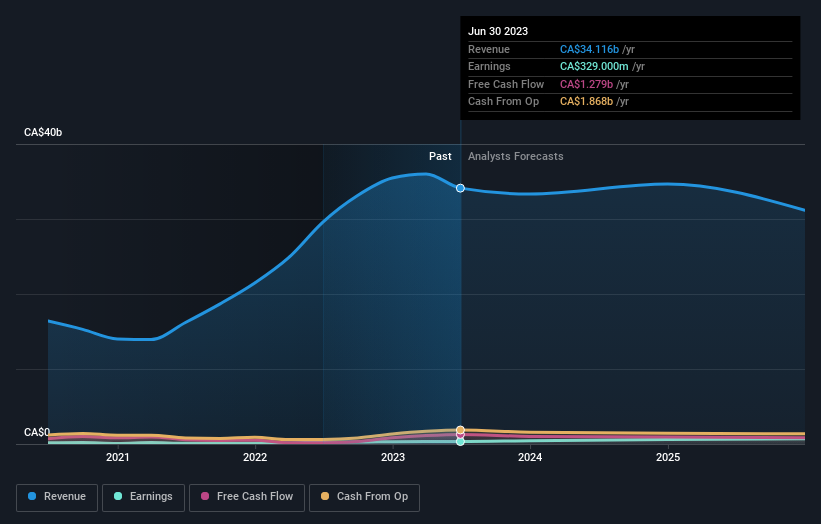Parkland Corporation's (TSE:PKI) largest shareholders are retail investors with 48% ownership, institutions own 32%
Key Insights
Parkland's significant retail investors ownership suggests that the key decisions are influenced by shareholders from the larger public
48% of the business is held by the top 25 shareholders
Every investor in Parkland Corporation (TSE:PKI) should be aware of the most powerful shareholder groups. The group holding the most number of shares in the company, around 48% to be precise, is retail investors. Put another way, the group faces the maximum upside potential (or downside risk).
Meanwhile, institutions make up 32% of the company’s shareholders. Generally speaking, as a company grows, institutions will increase their ownership. Conversely, insiders often decrease their ownership over time.
Let's take a closer look to see what the different types of shareholders can tell us about Parkland.
Check out our latest analysis for Parkland
What Does The Institutional Ownership Tell Us About Parkland?
Many institutions measure their performance against an index that approximates the local market. So they usually pay more attention to companies that are included in major indices.
We can see that Parkland does have institutional investors; and they hold a good portion of the company's stock. This suggests some credibility amongst professional investors. But we can't rely on that fact alone since institutions make bad investments sometimes, just like everyone does. It is not uncommon to see a big share price drop if two large institutional investors try to sell out of a stock at the same time. So it is worth checking the past earnings trajectory of Parkland, (below). Of course, keep in mind that there are other factors to consider, too.
Hedge funds don't have many shares in Parkland. Looking at our data, we can see that the largest shareholder is Simpson Oil Limited with 20% of shares outstanding. FMR LLC is the second largest shareholder owning 9.1% of common stock, and The Vanguard Group, Inc. holds about 3.1% of the company stock. In addition, we found that Robert Espey, the CEO has 0.5% of the shares allocated to their name.
A deeper look at our ownership data shows that the top 25 shareholders collectively hold less than half of the register, suggesting a large group of small holders where no single shareholder has a majority.
While studying institutional ownership for a company can add value to your research, it is also a good practice to research analyst recommendations to get a deeper understand of a stock's expected performance. There are plenty of analysts covering the stock, so it might be worth seeing what they are forecasting, too.
Insider Ownership Of Parkland
The definition of an insider can differ slightly between different countries, but members of the board of directors always count. The company management answer to the board and the latter should represent the interests of shareholders. Notably, sometimes top-level managers are on the board themselves.
Insider ownership is positive when it signals leadership are thinking like the true owners of the company. However, high insider ownership can also give immense power to a small group within the company. This can be negative in some circumstances.
We can report that insiders do own shares in Parkland Corporation. The insiders have a meaningful stake worth CA$96m. Most would see this as a real positive. If you would like to explore the question of insider alignment, you can click here to see if insiders have been buying or selling.
General Public Ownership
The general public, who are usually individual investors, hold a 48% stake in Parkland. While this group can't necessarily call the shots, it can certainly have a real influence on how the company is run.
Private Company Ownership
We can see that Private Companies own 20%, of the shares on issue. It might be worth looking deeper into this. If related parties, such as insiders, have an interest in one of these private companies, that should be disclosed in the annual report. Private companies may also have a strategic interest in the company.
Next Steps:
It's always worth thinking about the different groups who own shares in a company. But to understand Parkland better, we need to consider many other factors. Be aware that Parkland is showing 3 warning signs in our investment analysis , and 1 of those is concerning...
If you would prefer discover what analysts are predicting in terms of future growth, do not miss this free report on analyst forecasts.
NB: Figures in this article are calculated using data from the last twelve months, which refer to the 12-month period ending on the last date of the month the financial statement is dated. This may not be consistent with full year annual report figures.
Have feedback on this article? Concerned about the content? Get in touch with us directly. Alternatively, email editorial-team (at) simplywallst.com.
This article by Simply Wall St is general in nature. We provide commentary based on historical data and analyst forecasts only using an unbiased methodology and our articles are not intended to be financial advice. It does not constitute a recommendation to buy or sell any stock, and does not take account of your objectives, or your financial situation. We aim to bring you long-term focused analysis driven by fundamental data. Note that our analysis may not factor in the latest price-sensitive company announcements or qualitative material. Simply Wall St has no position in any stocks mentioned.

 Yahoo Finance
Yahoo Finance 

